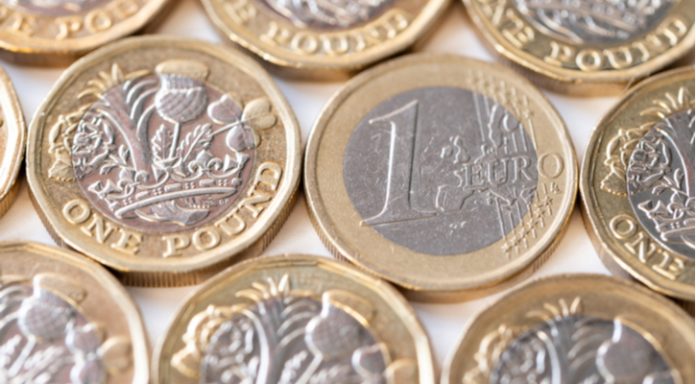As Theresa May’s political life hangs in the balance the pound tumbled versus the euro. The pound euro exchange rate hit a depth of €1.1251 in the previous session, a drop of 2%, before rising slightly into the close and again this morning.
| What do these figures mean? |
|---|
| When measuring the value of a pair of currencies, one set equals 1 unit and the other shows the current equivalent. As the market moves, the amount will vary from minute to minute.h If the euro amount increases in this pairing, it’s positive for the pound. Or, if you were looking at it the other way around:1 EUR = 0.87271 GBPIn this example, €1 is equivalent to approximately £0.87. This measures the euro’s worth versus the British pound. If the sterling number gets larger, it’s good news for the euro. |
Pressure continued to mount on Theresa May in the previous session. After a 5-hour gruelling cabinet meeting earlier in the week Theresa May managed to get her cabinets approval for the Brexit deal. However, the pound tumbled the following day as two cabinet ministers, including Brexit secretary Dominic Raab handed in letters of resignation in reaction to the deal.
A large number of Conservative MP’s are rumoured to have handed letters of no confidence to the Chairman of the 1922 Committee. Should the Chairman receive 48 letters then a vote of no confidence will be triggered. This is making pound traders very nervous. Time is short and if Theresa May goes, the chances of a Brexit deal going through are greatly reduced. Top business leaders and leading economists have frequently voiced their concerns of the impact of a disorderly no deal Brexit. Any signs that Theresa May could be on her way out and the Brexit deal could come to a grinding halt could continue to weigh on the pound.
| Why is a “soft” Brexit better for sterling than a “hard” Brexit? |
|---|
| A soft Brexit implies anything less than UK’s complete withdrawal from the EU. For example, it could mean the UK retains some form of membership to the European Union single market in exchange for some free movement of people, i.e. immigration. This is considered more positive than a “hard” Brexit, which is a full severance from the EU. The reason “soft” is considered more pound-friendly is because the economic impact would be lower. If there is less negative impact on the economy, foreign investors will continue to invest in the UK. As investment requires local currency, this increased demand for the pound then boosts its value. |
Today there is no high impacting UK economic data. The focus will remain squarely on the Theresa May and her ability to cling onto power.
Italy To Work With Brussels To Avoid Fines
The euro moved higher in the previous session as investors concerns over Italy eased. Reports that the Italian populist prime minister Giuseppe Conte was looking to work with the EU over his government’s budget for 2019 encouraged investors to by into the euro. So far the EU had rejected the Italian government’s budget for flouting EU spending rules. The move by the Italian government was an attempt to avoid massive fines which will be the consequence of ignoring the rules set out by the European Commission.
Today investors will be watching eurozone inflation data. Analysts are expecting CPI to have increased to 2.2% on a yearly basis, up from 2.1% in September. However, on a monthly basis analyst are expecting inflation to have fallen in the eurozone. Should this be the case it could dampen demand for the single currency. Weaker inflation makes it less probable that the central bank will hike interest rates.
| Why do raised interest rates boost a currency’s value? |
|---|
| Interest rates are key to understanding exchange rate movements. Those who have large sums of money to invest want the highest return on their investments. Higher interest rate environments tend to offer higher yields. So, if the interest rate or at least the interest rate expectation of a country is relatively higher compared to another, then it attracts more foreign capital investment. Large corporations and investors need local currency to invest. More local currency used then boosts the demand of that currency, pushing the value higher. |
This publication is provided for general information purposes only and is not intended to cover every aspect of the topics with which it deals. It is not intended to amount to advice on which you should rely. You must obtain professional or specialist advice before taking, or refraining from, any action on the basis of the content in this publication. The information in this publication does not constitute legal, tax or other professional advice from TransferWise Inc., Currency Live or its affiliates. Prior results do not guarantee a similar outcome. We make no representations, warranties or guarantees, whether express or implied, that the content in the publication is accurate, complete or up to date. Consult our risk warning page for more details.
This article was initially published on TransferWise.com from the same author. The content at Currency Live is the sole opinion of the authors and in no way reflects the views of TransferWise Inc.





